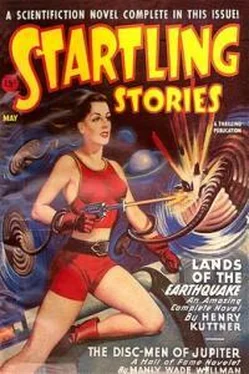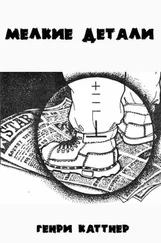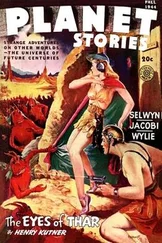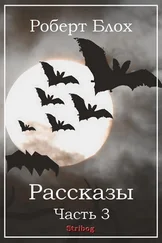Генри Каттнер - Lands of the Earthquake
Здесь есть возможность читать онлайн «Генри Каттнер - Lands of the Earthquake» весь текст электронной книги совершенно бесплатно (целиком полную версию без сокращений). В некоторых случаях можно слушать аудио, скачать через торрент в формате fb2 и присутствует краткое содержание. Год выпуска: 2017, Издательство: epubBooks Classics, Жанр: Фантастика и фэнтези, на английском языке. Описание произведения, (предисловие) а так же отзывы посетителей доступны на портале библиотеки ЛибКат.
- Название:Lands of the Earthquake
- Автор:
- Издательство:epubBooks Classics
- Жанр:
- Год:2017
- ISBN:нет данных
- Рейтинг книги:3 / 5. Голосов: 1
-
Избранное:Добавить в избранное
- Отзывы:
-
Ваша оценка:
- 60
- 1
- 2
- 3
- 4
- 5
Lands of the Earthquake: краткое содержание, описание и аннотация
Предлагаем к чтению аннотацию, описание, краткое содержание или предисловие (зависит от того, что написал сам автор книги «Lands of the Earthquake»). Если вы не нашли необходимую информацию о книге — напишите в комментариях, мы постараемся отыскать её.
Lands of the Earthquake — читать онлайн бесплатно полную книгу (весь текст) целиком
Ниже представлен текст книги, разбитый по страницам. Система сохранения места последней прочитанной страницы, позволяет с удобством читать онлайн бесплатно книгу «Lands of the Earthquake», без необходимости каждый раз заново искать на чём Вы остановились. Поставьте закладку, и сможете в любой момент перейти на страницу, на которой закончили чтение.
Интервал:
Закладка:
“You knew her in your world,” the Huntsman said. “You helped her in her work, which was—important. She left with you a certain talisman—a crystal, cold to the touch—that opens the gateway here. You used it, half by accident, I suspect, and came through the broken window on that cliff. I saw the flash the magic made from my tower here, and when I reached the cliff you were just awakening.” He paused, a curious look flickering across his face.
“I meant to kill you then,” he said. And Boyce suddenly recognized his look. Jealousy was in it. Yes, the Huntsman loved Irathe too, and hated her and himself because of it, and Boyce, because of—because of Boyce’s year with her on Earth.
“I would have killed you on sight,” he went on gently, his voice soft. “But I was not sure Irathe hadn’t summoned you. Until you did not return my signal, I could not be sure. And by then—well, my mind changes easily, William Boyce. I indulge my fancies.
“I let you go because a better thought had come to me. So I drove you toward Kerak. I knew an attack was starting on the castle then—Jamai’s efforts have redoubled of late because he grows weary of the struggle and longs to end it.
“I thought to myself, ‘He will die in Kerak if the attack succeeds. Let him die. But if it fails, let him live and be my eyes and brain to spy out what I can of Tancred’s secrets.’ Because, you see, you wore the talisman, and I have power over that crystal as well as Irathe. I made it for her, long ago, when she was—not as she is now.”
This time a shadow crossed the Huntsman’s face and Boyce saw the pale, strong features draw up in a grimace almost of pain.
“I think she left that amulet to summon you by when she was ready, and I think you came too soon. I saw you too soon. When she learned of your presence here it was too late, for I had entered your mind already by power of the talisman and there was no room for her.”
He laughed.
“She was wild when she learned that. She—but you do not know the secret of Irathe, do you, William Boyce? You do not know why you remember her as all that was lovely and delightful, or why she is not now—herself. Well, you shall know. Better still—you shall see!”
He got up lazily, reining in the frantic beasts, and strolled to the wall at the head of the dais. He pulled a cord hanging among the dark draperies, and curtains swept back on both sides to uncover a wall of clear mirror glass, in which only blue–gray mists swam as if it were a window upon the plains.
“Tancred has a mirror like this,” the Huntsman said casually. “But smaller. Now watch.”
The mists rolled back on both sides. A room took shape in the glass, as vividly as if the mirror were a wall of the room, and that wall transparent. The room was gigantic, ringed with pillars that reflected themselves in the shining black floor.
The pillars marched up in a double line to a great throne at the far end, black, hung with scarlet. A man sat on the throne, light catching in the crown he wore. He was not young, and he was bending forward eagerly in his robe of yellow satin, stroking a dark beard and watching.
Boyce closed his eyes suddenly and whirled on his heel, his back to the mirror. He was shaking and the sweat felt cold on his forehead.
The Huntsman laughed softly.
“Yes, I know. They are not good to look at. But watch if you can, my friend. They wear robes, so you need not look Them in the face. And this they do is important to my story—and to you.”
Chapter XII
A Cure for Sorcery
Slowly, his body rigid, Boyce turned back to the mirror. He could not look directly at Them, but by watching the corners of the picture and keeping his jaw set hard and his fists clenched, he managed to control his shaking and to see what went on in the mirrored room.
They were only two, tall, robed figures hidden entirely from sight, but moving with an impossible litheness that somehow set the teeth on edge. They were walking—gliding—about a circle of glittering stones laid upon the black floor before the throne. Their robed limbs moved now and then in gestures of ritual.
“The Sorcerer King,” the Huntsman said, “is a man hungry for power. He loves power and knowledge for their own sakes. He guides this City along the drifting lands as ships are guided in other worlds, seeking new people and new places and new sources of power. Also, he picks up other treasures.
“When he was younger, he found one treasure he prized highly—a lovely fair–haired woman in outlandish garments, wearing a cross emblazoned on her bosom. She came from a castle built high on the cliffs of certain mountains the City was then drifting near. The King was pleased with her and took her into his household.
“You know that story. She bore him a daughter and then died. He loved the daughter, but he did her a terrible wrong. He had not guessed how what he did would affect himself or her, or many people he had not then heard of. The daughter was a lovely creature. Also she was wise and skilled in many arts. When the King came across a source of power and knowledge beside which all he had discovered before seemed tame, he shared the discovery with his daughter.
“There was one trouble only. That source—those who knew what he wished to share—were so alien that eyes like ours can not bear to look upon Them. They live in another city, traveling these drifting lands, but very far from here.
“A few of their travelers chanced into our City, and the King was enthralled by Them, but he had no way of communicating with Them. For one thing, not even he could bear to look Them in the face or listen to their voices. And yet he could not bear to give up commerce with Them altogether.
“They told him of one way only by which they might communicate. A very old way. Almost all peoples have it, and all old legends. It means the sacrifice of a maiden.
“She would have to submit herself to their sorcery, and thereafter would serve as liaison between the two peoples. The human mind, They said, was too complex, too hybrid, to deal with minds like Theirs. Their sorcery would change the mind of their instrument, dividing it in a way to make communication possible. They did not tell us, then, what else the sorcery might do.
“The King chose his daughter for that sacrifice. This thing meant more to him even than she, and she was the one alone, he thought, whom he could trust in a position of such power. Too, I think their kinship was to help in the transmission of knowledge from Them to the King.
“It happened without my knowledge. I loved the King’s daughter very deeply. I should have interfered, had I guessed. But I came just as the ceremony was beginning, and until it was too late I did not know—”
He turned his back to the mirror and struggled with his beasts, bending over them as if he did not want to see that scene again.
“Look,” he said.
They moved with intricate, hideously lithe steps about the circle of fiery stones. There was a veiled figure in the center of the circle now, and the King was leaning forward, a look of pain and eagerness on his face.
Fire leaped from the shining circle on the floor. It blazed to a pyramid of white light, and when it sank again the veil had vanished from the girl in its midst. She looked out with blank, unseeing eyes, violet under an iron crown. Her dark hair lay in ringlets on her shoulders.
She had a lovely, soft mouth and even now, a look of vividness and a delicate, familiar beauty which made Boyce lean forward suddenly and catch his breath, forgetting even the figures parading around the fire with snake–like motions of their robed arms.
“ Irathe —” he heard himself whisper.
Читать дальшеИнтервал:
Закладка:
Похожие книги на «Lands of the Earthquake»
Представляем Вашему вниманию похожие книги на «Lands of the Earthquake» списком для выбора. Мы отобрали схожую по названию и смыслу литературу в надежде предоставить читателям больше вариантов отыскать новые, интересные, ещё непрочитанные произведения.
Обсуждение, отзывы о книге «Lands of the Earthquake» и просто собственные мнения читателей. Оставьте ваши комментарии, напишите, что Вы думаете о произведении, его смысле или главных героях. Укажите что конкретно понравилось, а что нет, и почему Вы так считаете.

![Генри Каттнер - Очи Тхара [The Eyes of Thar]](/books/28174/genri-kattner-ochi-thara-the-eyes-of-thar-thumb.webp)


![Генри Каттнер - Сын несущего расходы [= Сын волынщика; Один из несущих расходы]](/books/255796/genri-kattner-syn-nesuchego-rashody-syn-volynchik-thumb.webp)




